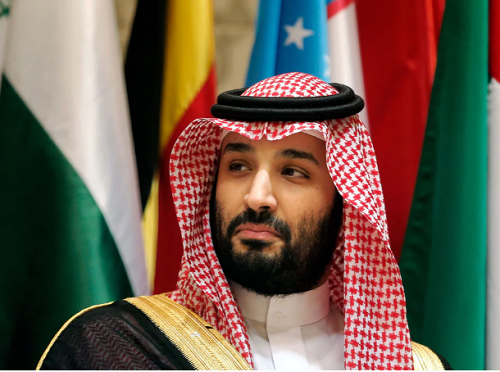Saudi Arabia May Execute Teenager for His Protests — Including When He Was 10

IN 2011, as Arab Spring protests swept across the Middle East, demonstrations also kicked off in Saudi Arabia’s oil-rich Eastern Province. Members of the kingdom’s repressed Shiite minority took to the streets, calling for equal rights and a fairer distribution of oil revenues. The protesters included a group of around 30 kids on bicycles. As a videoreleased last week by CNN shows, those children were led by a smiling 10-year-old in flip-flops named Murtaja Qureiris.
“The people demand human rights!” the young boy can be seen shouting through a megaphone.
Here’s the problem: Demanding human rights in Saudi Arabia lands you in prison. Even if you’re a kid.
Three years later, in September 2014, 13-year-old Murtaja was arrested while on his way to neighboring Bahrain with his family.
“At the time,” reports CNN, “he was considered by lawyers and activists to be the youngest known political prisoner in Saudi Arabia.
Over the past four years, say human rights groups, this teenager has been subjected to torture and intimidation, as well as a spell in solitary confinement. He has been denied access to a lawyer while interrogators try to get him to confess to the trumped-up charges against him. These include “participating in anti-government protests, attending the funeral of his brother Ali Qureiris who was killed in a protest in 2011, joining a ‘terrorist organization,’ throwing Molotov cocktails at a police station, and firing at security forces,” according to Amnesty International.
Last week, we learned that Saudi prosecutors are seeking the death penalty for 18-year-old Murtaja, who is being tried in an anti-terror court. CNN reports that the prosecutors want to “impose the harshest form of the death penalty, which may include crucifixion or dismemberment after execution.”
Got that? The unelected government of a close ally of the United States is planning on brutally executing an 18-year-old member of a minority group, for crimes allegedly committed when he was 10 years old.
Let me repeat: Ten. Years. Old.
We shouldn’t forget the person who is primarily responsible for this outrage: Crown Prince Mohammed bin Salman, or MBS. Since his father installed him in power, the violent crushing of political dissent has escalated. According to the CIA, MBS ordered the horrific murder of Washington Post columnist Jamal Khashoggi inside the Saudi consulate in Istanbul. He is also behind the targeting of three Arab activists in Norway, Canada, and the United States.
Much has (rightly) been made of the crown prince’s shocking record on extrajudicial killings. But what of the growing number of judicially sanctioned killings inside of Saudi Arabia on his watch? The planned execution of Murtaja Qureiris may be the most horrendous act yet.
“There should be no doubt that the Saudi Arabian authorities are ready to go to any length to crack down on dissent against their own citizens, including by resorting to the death penalty for men who were merely boys at the time of their arrest,” says Lynn Maalouf, Middle East research director at Amnesty International.
The Gulf kingdom is one of the world’s top executioners and, according to Maalouf, Saudi authorities have “a chilling track record of using the death penalty as a weapon to crush political dissent and punish anti-government protesters — including children — from the country’s persecuted Shi’a minority.”
The majority of the country, and the ruling family, are from a strict school of Sunni Islam called Salafism. In April, 37 people were executed in a single day — the biggest mass execution in the kingdom since 2016 — and the vast majority of them were believed to be Shiites. Three of them, according to human rights group Reprieve, were “minors at the time of their alleged offences.” Such executions, as both Reprieve and Amnesty International have noted, are a brazen violation of international human rights law.
Another three Saudi Shiites — Ali al-Nimr, Dawood al-Marhoon, and Abdullah al-Zaher — who were also below the age of 18 at the time of their alleged crimes, are still on death row and could be executed at anytime.
It isn’t just Shiites, either. MBS has also targeted Sunni clerics who have failed to fall into line. There have been reports that the belligerent and thin-skinned crown prince plans on executing three high-profile Saudi religious scholars — Salman al-Odah, Awad al-Qarni, and Ali al-Omari — all of whom have been held on multiple charges of “terrorism.” 62-year-old Odah is famous in the Arab world for his relatively progressive views on Islam and homosexuality and his 2007 denunciation of Osama bin Laden. His actual “crime”? Tweeting a prayer for reconciliation between Saudi Arabia and its Gulf rival, the Emirate of Qatar. (Full disclosure: I host two TV shows for Qatar-funded Al Jazeera English.)
Supporters of MBS often try and argue that these executions are the product of decisions made in court, not in the royal palace. This is a laughable defense. The kingdom of Saudi Arabia is an absolute monarchy. There is no independent judiciary. As CNN reports, “The death penalty can only be enforced by order of King Salman or his authorized representative. Crown Prince Mohammed bin Salman is frequently characterized as the King’s deputy.”
Forget MBS the reformer; meet MBS the executioner. The fact that he has been embraced closely by everyone from Donald Trump to Emmanuel Macron to Theresa May should be a source of shame for those of us living in the West. To quote former Obama-era National Security Council spokesperson Tommy Vietor, MBS is “Kim Jong Un with oil money.”